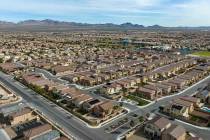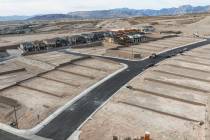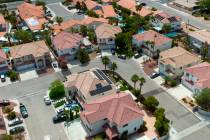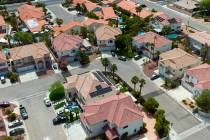Cities unite to get housing funds
As the foreclosure crisis drags on, four local governments are banding together to pursue $367 million in federal money to rid neighborhoods of empty houses.
Clark County, North Las Vegas, Henderson and Las Vegas are teaming up so they'll be more competitive in vying nationally for federal stimulus money that will be dispensed through the Neighborhood Stabilization Program's second phase.
County officials orchestrating the team effort are scrambling to get all the governments' funding requests in line with federal rules so they can apply for the money by the July 17 deadline.
The funds will aid areas that fell victim to subprime lending and are less able to recover than affluent areas, said Mike Pawlak, management analyst for the county's finance department.
"This program will help those neighborhoods get back to par with the rest of the valley," Pawlak said.
As of June, more than 14,000 homes were in foreclosure in the valley and about 55,500 dwellings were vacant, according to a county estimate.
If the consortium gets all it asks for, North Las Vegas would receive the biggest chunk, $120 million, because it has the most affected areas, Pawlak said. About $102 million would go to Las Vegas, $100 million to the county and $44.4 million to Henderson.
Created by Congress last year, the program's first phase funneled a total of $64 million to the county, North Las Vegas and Las Vegas to mainly restore and resell homes left vacant by foreclosures. That money became available about two weeks ago.
This second phase will use stimulus money instead of dollars set aside to aid hard-hit regions like Southern Nevada, making the funding more competitive, Pawlak said.
The Department of Housing and Urban Development will inform the county in September if the consortium qualified for the funding. If eligible, the local entities will find out in February how much money they will receive and should begin seeing dollars flow in next year, Pawlak said.
If HUD approves the full amount, about 5,200 homes could get improved or razed, he said.
Nonprofit housing agencies working with the local governments will use some of the money to buy empty houses from the banks for 1 percent below the appraised market value, Pawlak said. A rule previously required buying the houses at 15 percent below market value but was changed because home prices have plunged, he said.
The agencies will hire contractors to do the work, then resell the ones that can be fixed up, he said.
The three-year plan calls for:
• $133 million to renovate dwellings to rent out.
• $100 million to buy, renovate and resell properties.
• $84 million to build new public housing on vacant sites.
• $26 million to aid home buyers.
• $17 million for administration.
• $6.5 million for demolition.
A couple of county commissioners echoed earlier complaints about rules not allowing the money to be spent to prevent foreclosures.
"I feel like we can't get to the root of the serious problem before us," said Commissioner Susan Brager, who works in real estate. "I don't like having my hands tied. It's going to be challenging to make an impact."
Commissioner Lawrence Weekly said early prevention is vital to keep from compounding the problem.
Still, Weekly thinks that $367 million is a hefty sum that could do a lot of good. President Barack Obama has acknowledged that Southern Nevada was hit hard by foreclosures, making the agencies under him more likely to approve funding, he said.
"I'm very optimistic," Weekly said.
Contact reporter Scott Wyland at swyland@reviewjournal.com or 702-455-4519.

















